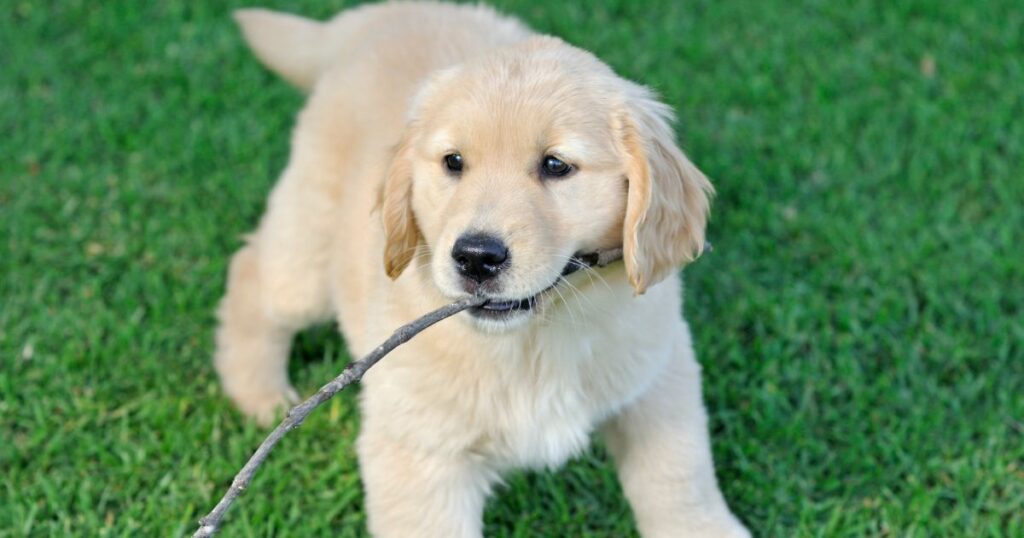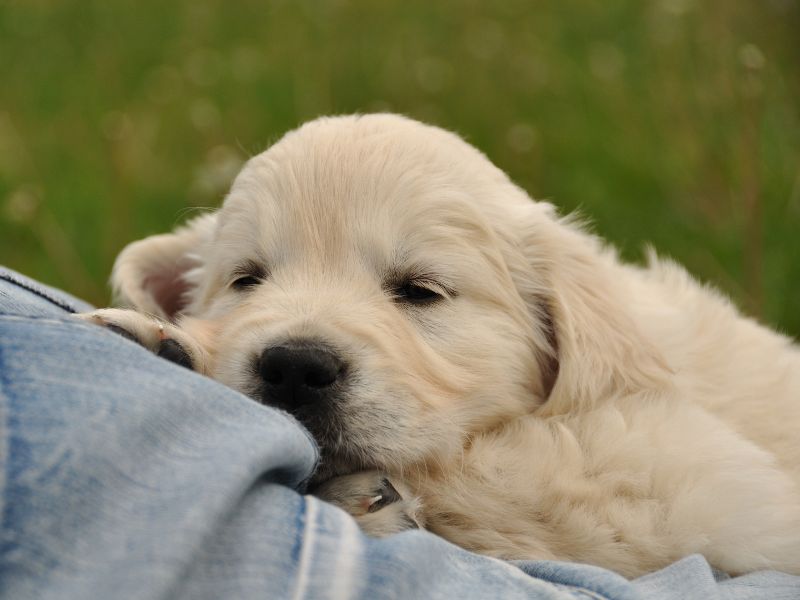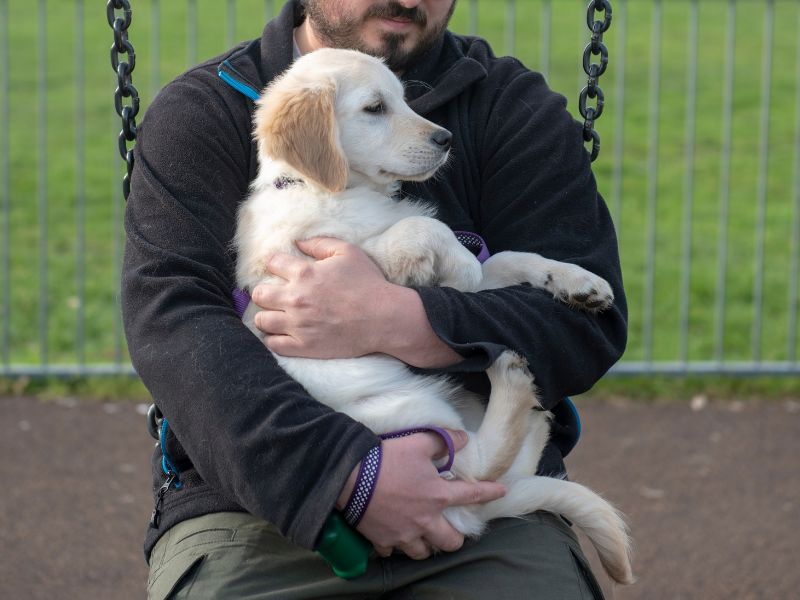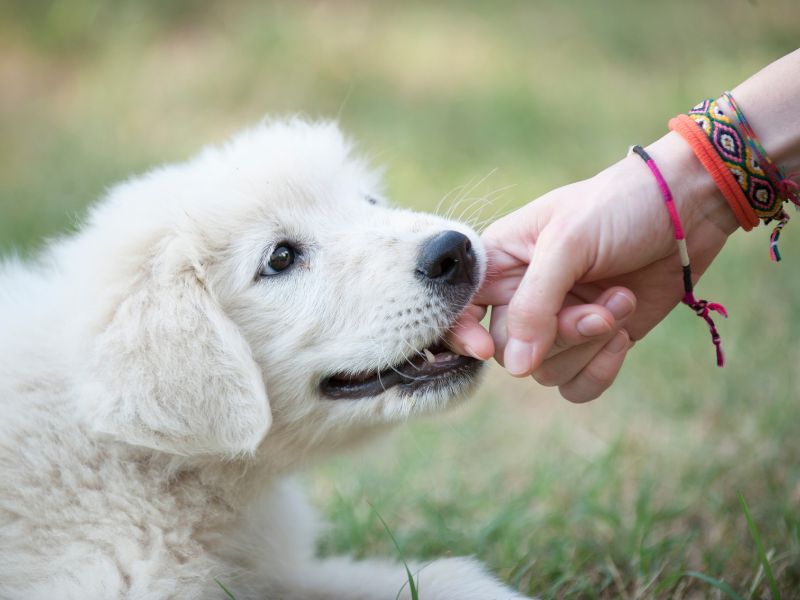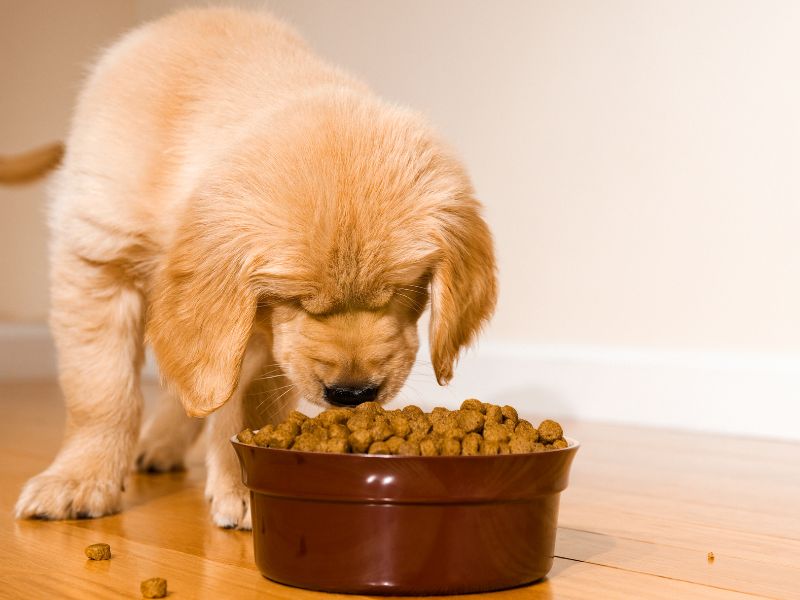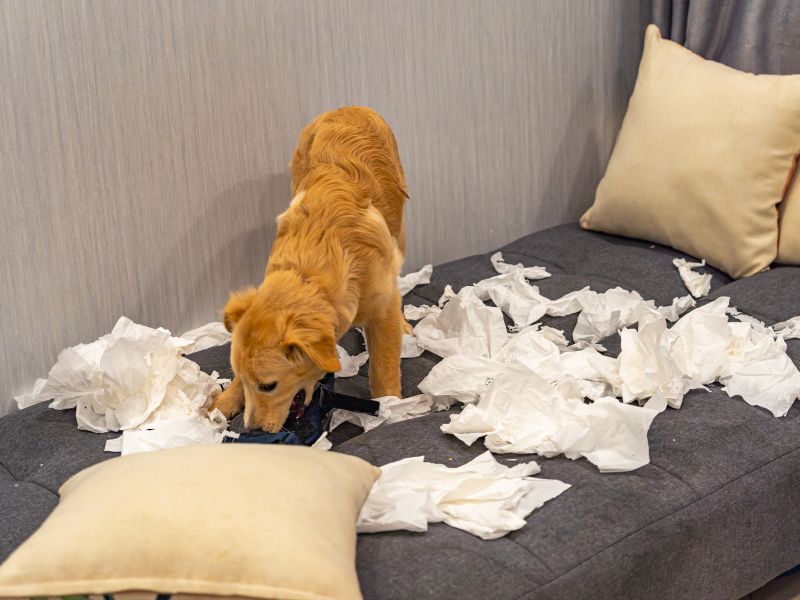Golden retriever puppies are undoubtedly one of the cutest animals on the planet. Their adorable faces and fluffy fur make them a popular choice for families looking for a new pet. However, owning a puppy, especially a golden retriever, comes with a lot of responsibility. Future puppy owners need to be aware of the challenges they might face when bringing home a new furry friend.
To help future golden retriever puppy owners prepare for their new addition, here are some warnings to keep in mind. Firstly, puppies require a lot of time and attention. They need to be fed regularly, taken out for walks, and trained. If you’re not prepared to commit to these responsibilities, then a puppy might not be the best choice for you.
Secondly, puppies can be destructive. They love to chew on things, including furniture, shoes, and even walls. Puppy-proofing your home is essential to avoid any potential damage. Additionally, puppies can be messy, and accidents are bound to happen. Being patient and prepared to clean up messes is crucial when owning a puppy.
It’s Not Always Love at First Sight
Bringing home a new Golden Retriever puppy is an exciting experience, but it’s important to remember that it’s not always love at first sight. While it’s true that some puppies may instantly bond with their new owners, others may take some time to warm up and adjust to their new surroundings.
It’s important for new puppy owners to be patient and understanding during this adjustment period. Puppies may be scared or anxious in their new environment, and it may take some time for them to feel comfortable and safe.
Additionally, it’s important to remember that puppies have their own personalities and preferences. While some may be more outgoing and affectionate, others may be more independent and reserved. It’s important to respect your puppy’s personality and not force them to be something they’re not.
Overall, it’s important for new Golden Retriever puppy owners to be patient, understanding, and respectful of their puppy’s personality and preferences. With time and patience, a strong bond can be formed between a puppy and their owner.
Your Puppy Needs to Go Out. A Lot.
Taking care of a golden retriever puppy is a big responsibility, and one of the most important things to remember is that your puppy needs to go out frequently. Puppies have small bladders and can’t hold their pee for very long, so it’s important to take them out often to avoid accidents in the house.
According to Golden Hearts, puppies need to go out as often as every 30 minutes to an hour, especially after eating, drinking, playing, or napping. As they get older, they may be able to hold it for longer periods, but it’s still important to take them out regularly.
It’s also important to establish a routine for taking your puppy out. This will help them learn when it’s time to go and make it easier for you to anticipate their needs. For example, you may want to take them out first thing in the morning, after meals, before bedtime, and after playtime.
If you’re worried about not being able to take your puppy out as often as they need, you may want to consider hiring a dog walker or asking a friend or family member for help. You can also set up a designated potty area in your yard or on your balcony if you live in an apartment.
Remember, taking your puppy out frequently is an important part of their training and will help them develop good potty habits. With patience and consistency, your puppy will learn to go outside and avoid accidents in the house.
Your Puppy’s Favorite Activity is Biting Your Fingers
Golden Retriever puppies are known for being playful and energetic, and one of their favorite activities is biting and nipping. While this behavior is normal for puppies, it can be frustrating and even painful for their owners. It’s important to teach your puppy bite inhibition, which is the ability to control the force of their bite.
One effective way to stop your puppy from biting is to let out a loud “yelp” or “ouch” when they bite too hard. This will startle them and let them know that they have hurt you. You can then redirect their attention to a toy or chew bone. Consistency is key when teaching bite inhibition, so be sure to use this method every time your puppy bites too hard.
Another way to discourage biting is to use taste deterrents, which are sprays or gels that taste unpleasant to dogs. You can apply these to your hands or other objects that your puppy likes to bite. They will quickly learn that biting these objects is not enjoyable and will stop doing it.
It’s also important to provide your puppy with plenty of exercise and mental stimulation. A tired puppy is less likely to engage in biting behavior. You can take your puppy for walks, play fetch, or engage in other activities that they enjoy.
In summary, biting is a normal behavior for Golden Retriever puppies, but it’s important to teach them bite inhibition and discourage biting of hands and other objects. Using a combination of techniques such as redirecting, taste deterrents, and providing exercise and mental stimulation will help your puppy learn good behavior and become a well-behaved adult dog.
Puppies Get Sick
Bringing a new puppy home is an exciting time, but it’s important to remember that puppies can get sick just like humans. It’s essential to be aware of common puppy illnesses and how to spot them early on to ensure your furry friend stays healthy.
One of the most common illnesses that puppies can get is Parvovirus, or Parvo for short. This highly contagious virus affects a puppy’s gastrointestinal system and can cause vomiting, diarrhea, and dehydration. Puppies can contract Parvo through contact with infected feces or contaminated surfaces. It’s crucial to make sure your puppy is up-to-date on their vaccinations and avoid exposing them to unvaccinated dogs or areas with high levels of Parvo contamination.
Another common issue that puppies face is diarrhea. There are many reasons why a puppy might experience diarrhea, including a change in diet, bacterial or viral infections, ingestion of foreign objects, parasites, or stress. It’s important to monitor your puppy’s bowel movements and seek veterinary care if the diarrhea persists or is accompanied by other symptoms.
Puppies can also experience other health problems such as ear infections, skin problems, and hip dysplasia. It’s essential to keep an eye on your puppy’s behavior and health, and seek veterinary care if you notice any concerning symptoms. By staying informed about common puppy illnesses and taking preventative measures, you can help ensure that your furry friend stays healthy and happy.
Puppies Are Expensive
Taking care of a Golden Retriever puppy can be quite expensive. The initial cost of purchasing a purebred puppy from a reputable breeder can range from $500 to $3,000. This price may vary depending on the breeder’s reputation, the puppy’s bloodline, and other factors. It’s essential to find a reputable breeder to ensure that the puppy is healthy and has been bred responsibly.
In addition to the initial cost of purchasing a puppy, there are other expenses to consider. Puppies need regular veterinary checkups, vaccinations, and preventative care, which can add up quickly. Puppy owners should also budget for food, toys, grooming supplies, and other essentials.
It’s important to note that while owning a Golden Retriever can be expensive, it’s also a long-term investment. These dogs can live up to 12 years or more with proper care and attention. Therefore, it’s crucial to budget accordingly and make sure that the puppy is a good fit for the family before making a purchase.
Overall, while the cost of owning a Golden Retriever puppy may seem daunting, it’s important to remember that the love and companionship they provide are priceless. With proper planning and budgeting, anyone can provide a happy and healthy home for a Golden Retriever puppy.
Your Puppy Will Destroy Things
When bringing a Golden Retriever puppy into your home, it’s important to remember that they are still young and will likely destroy things. Puppies are known for chewing on anything they can get their teeth on, including furniture, shoes, and even walls. This behavior is typical and should not be a cause for alarm.
To prevent your puppy from destroying your belongings, it’s important to provide them with plenty of chew toys. This will give them an outlet for their chewing behavior and prevent them from turning to your belongings. Be sure to supervise your puppy while they are playing with their toys to ensure they do not accidentally ingest any small pieces.
In addition to providing chew toys, it’s important to keep your belongings out of reach of your puppy. This means keeping shoes and other items in closed closets or drawers, and keeping furniture away from the walls. It’s also a good idea to use bitter apple spray on items you do not want your puppy to chew on.
Remember, your Golden Retriever puppy is still learning and will make mistakes. With patience and proper training, they will eventually grow out of their destructive behavior. In the meantime, providing them with plenty of chew toys and keeping your belongings out of reach will help prevent any unnecessary damage.
Your Puppy Will Wake You Up in the Night
Getting a new puppy can be exciting, but it also comes with a lot of responsibility. One of the things that new puppy owners should be prepared for is being woken up in the middle of the night. Golden Retriever puppies will need to go outside to relieve themselves, and they may need to do so several times during the night.
It’s important to be patient with your puppy during this time. They are still adjusting to their new surroundings and may be scared or anxious. Try to keep the lights low and avoid playing with your puppy during these nighttime potty breaks. This will help them understand that it’s time to go back to sleep.
To make nighttime potty breaks easier, consider using a crate or playpen. This will give your puppy a designated sleeping area and help prevent accidents in the house. Make sure the crate or playpen is big enough for your puppy to stand up, turn around, and lie down comfortably.
It’s also important to establish a routine for your puppy. Take them out for one last potty break before bed, and try to stick to a consistent feeding schedule. This will help regulate their digestive system and make nighttime potty breaks less frequent.
Overall, waking up in the middle of the night may be an inconvenience, but it’s a necessary part of raising a happy and healthy Golden Retriever puppy. With patience and consistency, your puppy will eventually learn to sleep through the night.
They’re Worth It
Golden Retrievers are a popular breed for a reason. They are friendly, loyal, and affectionate dogs that make great family pets. While it’s true that owning a Golden Retriever puppy comes with its challenges, it’s also true that they are worth it in the end.
Despite the potential difficulties of housebreaking, training, and socializing a new puppy, Golden Retrievers are known for their loving and gentle nature. They are great with children and make wonderful companions for adults as well. Their intelligence and eagerness to please make them easy to train, and their adaptability to different locations means they can fit into a variety of lifestyles.
In addition to their wonderful personalities, Golden Retrievers are also beautiful dogs. Their long, golden coats are soft and shiny, and they have a friendly and approachable appearance. They are also relatively healthy dogs, with few major health issues to worry about.
Overall, while owning a Golden Retriever puppy may require some extra effort and patience at times, the rewards are well worth it. These dogs are loyal, loving, and make wonderful companions for families and individuals alike.

